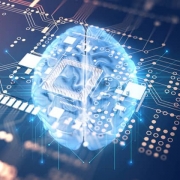How Artificial Intelligence and Machine Learning Will Reshape Enterprise Technology
Artificial intelligence (AI) and machine learning (ML) are a universal staple in many in consumers’ lives, from streaming service suggestions of what to watch next to GPS route options based on your past behavior. AI can emulate human decision-making from the algorithm-driven foundation of ML that enables the former. We see automation as something that would better our lives by limiting our choices. Whereas in a larger sense, these automation technologies can be used by companies in many aspects of the business – from transporting products to warehouse workers for packing, processing invoices, to assisting with many other repetitive business tasks. It’s clear that AI and ML has made a huge impact in enterprise technology. Tech-driven solutions from these automation tools have helped companies reduce costs, create a more efficient logistics chain, and free up employees to add value to their organizations in other positions. Nate Farshchi, media and telecommunications senior analyst with RSM US LLP, shares an article on BuiltIn – the online community for startups and tech companies – indicating that plenty of strong signals indicate that AI, ML, and automation will play an important role in the future of business. Accenture notes that, currently, “only 12 percent of enterprise applications are utilizing AI and ML at a maturity level which results in a significant competitive advantage.” IDC has also estimated that “90 percent of enterprise applications will be supplemented by artificial intelligence and machine learning (AI & ML) by the year 2025.” Farshchi notes that adopting AI and ML applications is also becoming less expensive and faster because of lower training costs and quicker training periods for their employees. The future of AI, ML, and automation, Farshchi concludes, appears to be bright and has a very high ceiling. Businesses should act now to get ahead with this enterprise technology.



